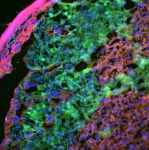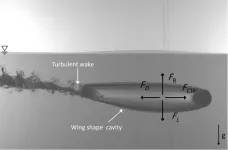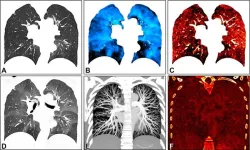(Press-News.org) Unborn babies use ‘greedy’ gene from dads to ‘remote-control’ mums into feeding them extra food
Fetuses use a copy of a gene inherited from their dad to force their mum to release as much nutrients as possible during pregnancy, Cambridge scientists have discovered.
The unborn baby ‘remote controls’ its mother’s metabolism so the two are in a nutritional tug of war. The mother’s body wants the baby to survive but needs to keep enough glucose and fats circulating in her system for her own health, to be able to deliver the baby, breastfeed and to reproduce again.
A new study from the University of Cambridge published today (11 July 2023) examines how the placenta communicates with the mother through the release of hormones so she will accommodate her baby’s growth. The placenta is a vital organ that develops with the fetus in pregnant women and other female mammals to support the developing fetus. In pregnant mice, scientists selectively altered the signalling cells in the placenta that tell mothers to allocate nutrients to her developing fetuses.
Professor Amanda Sferruzzi-Perri, Professor in Fetal and Placental Physiology, a Fellow of St John’s College and co-senior author of the paper, said: “It’s the first direct evidence that a gene inherited from the father is signalling to the mother to divert nutrients to the fetus.”
Dr Miguel Constancia, MRC Investigator based at the Wellcome-MRC Institute of Metabolic Science and co-senior author of the paper, said: “The baby’s remote control system is operated by genes that can be switched on or off depending on whether they are a ‘dad’s’ or ‘mum’s’ gene’, the so-called imprinted genes.
“Genes controlled by the father are ‘greedy’ and ‘selfish’ and will tend to manipulate maternal resources for the benefit of the fetuses, so to grow them big and fittest. Although pregnancy is largely cooperative, there is a big arena for potential conflict between the mother and the baby, with imprinted genes and the placenta thought to play key roles.”
The findings by researchers from the Centre for Trophoblast Research at Cambridge’s Department of Physiology, Development and Neuroscience and the Medical Research Council Metabolic Diseases Unit, part of the Wellcome-MRC Institute of Metabolic Science, have been published in Cell Metabolism.
The baby’s genes controlled by the father tend to promote fetal growth and those controlled by the mother tend to limit fetal growth.
Professor Sferruzzi-Perri explained: “Those genes from the mother that limit fetal growth are thought to be a mother’s way of ensuring her survival, so she doesn’t have a baby that takes all the nutrients and is too big and challenging to birth. The mother also has a chance of having subsequent pregnancies potentially with different males in the future to pass on her genes more widely.”
Researchers deleted the expression of an important imprinted gene called Igf2, which provides instructions for making a protein called ‘Insulin Like Growth Factor 2’. Similar to the hormone insulin, which is responsible for making and controlling glucose levels in our circulation, the gene promotes fetal growth and plays a key part in the development of fetal tissues including the placenta, liver and brain.
Dr Jorge Lopez-Tello, a lead author of the study based at the University’s Department of Physiology, Development and Neuroscience, said: “If the function of Igf2 from the father is switched off in signalling cells, the mother doesn’t make enough amounts of glucose and lipids – fats – available in her circulation. These nutrients therefore reach the fetus in insufficient amounts and the fetus doesn’t grow properly.”
The scientists found that deleting Igf2 from the placenta’s signalling cells affects the production of other hormones that modulate the way the mother’s pancreas produces insulin, and how her liver and other metabolic organs respond.
“We found Igf2 controls the hormones responsible for reducing insulin sensitivity in the mother during pregnancy. It means the mother’s tissues don’t absorb glucose so nutrients are more available in the circulation to be transferred to the fetus,” said Professor Sferruzzi-Perri.
Babies with Igf2 gene defects can be overgrown or growth-stunted. “Until now, we didn’t know that part of the Igf2 gene’s role is to regulate signalling to the mother to allocate nutrients to the fetus,” added Professor Sferruzzi-Perri.
The mice studied were smaller at birth and their offspring showed early signs of diabetes and obesity in later life.
Professor Sferruzzi-Perri said: “Our research highlights how important the controlled allocation of nutrients to the fetus is for the lifelong health of the offspring, and the direct role the placenta plays.
“The placenta is an amazing organ. At the end of pregnancy, the placenta is delivered by the mother, but the memories of how the placenta was functioning leaves a lasting legacy on the way those fetal organs have developed and then how they’re going to function through life.”
The next step is to understand how placental hormones are controlled by Igf2 and what those hormones are doing. Future research could help scientists discover new strategies to target the placenta to improve health outcomes for mums and babies.
END
Unborn babies use ‘greedy’ gene from dads to ‘remote-control’ mums into feeding them extra food
Fetuses use a copy of a gene inherited from their dad to force their mum to release as much nutrients as possible during pregnancy, Cambridge scientists have discovered.
2023-07-11
ELSE PRESS RELEASES FROM THIS DATE:
The science behind skipping stones
2023-07-11
WASHINGTON, July 11, 2023 – Inspired by the need to safeguard marine animals and promote sustainable solutions within marine environments, an interdisciplinary team of researchers from King Abdullah University of Science and Technology in Saudi Arabia and Sofia University in Bulgaria are delving into the hydrodynamics of buoyant objects at the air-water interface.
By studying these dynamics, their goal is to expand the understanding of fluid hydrodynamics and complex surface interactions – and advance fields such as the design and performance of marine engineering systems, buoy systems, and ...
Association of racial discrimination with obesity in children and adolescents
2023-07-11
About The Study: The findings of this study suggest that personally mediated racial discrimination may be a risk factor for developing obesity in children and adolescents, above and beyond socioeconomic status. The results highlight the need for a multifaceted approach to address racial discrimination and its impact on the health of children and adolescents.
Authors: Adolfo G. Cuevas, Ph.D., of the New York University School of Global Public Health in New York, is the corresponding author.
To access the embargoed study: Visit our For The Media website at this link https://media.jamanetwork.com/
(doi:10.1001/jamanetworkopen.2023.22839)
Editor’s Note: Please ...
Association between historical neighborhood redlining and cardiovascular outcomes among veterans
2023-07-11
About The Study: In this cohort study of U.S. veterans, the findings suggest that those with atherosclerotic cardiovascular disease who reside in historically redlined neighborhoods continue to have a higher prevalence of traditional cardiovascular risk factors and higher cardiovascular risk. Even close to a century after this practice was discontinued, redlining appears to still be adversely associated with adverse cardiovascular events.
Authors: Sadeer Al-Kindi, M.D., of University Hospitals in Cleveland, and Salil V. Deo, ...
Genome sequencing nearly twice as effective as a targeted gene-sequencing test at diagnosing genetic disorders in newborns and infants
2023-07-11
July 11, 2023 (BOSTON) – A new national study, led by researchers at Tufts Medical Center in Boston, has found whole genome sequencing (WGS) to be nearly twice as effective as a targeted gene sequencing test at identifying abnormalities responsible for genetic disorders in newborns and infants. The study, “A Comparative Analysis of Rapid Whole Genomic Sequencing and a Targeted Neonatal Gene Panel in Infants with a Suspected Genetic Disorder: The Genomic Medicine for Ill Neonates and Infants ...
Racial discrimination increases risk for childhood obesity
2023-07-11
Children who experience racial discrimination are more likely to later have a higher body mass index (BMI) and larger waistline, according to a new study published in JAMA Network Open. The findings illustrate that racial discrimination may be a risk factor for young people developing obesity—above and beyond other socioeconomic factors such as family income.
“Exposure to racial discrimination must be acknowledged as both a social determinant of obesity and a significant contributor to obesity disparities among children and adolescents,” said Adolfo Cuevas, assistant professor of social and behavioral sciences at the NYU School of Global Public Health and the study’s ...
First large US clinical trial of cytisinicline finds the smoking cessation medication effective and well tolerated
2023-07-11
BOSTON – The first large-scale U.S. clinical trial of cytisinicline, led by a Massachusetts General Hospital (MGH) investigator, found the smoking cessation medication to be effective and well tolerated in adults who wished to break their nicotine dependence. In the Phase 3 study published in JAMA, researchers reported that cytisinicline could offer adults who smoke a potential new treatment option.
“Cigarette smoking remains the leading preventable cause of death worldwide, yet no new smoking cessation medication has been approved by the U.S. Food and Drug Administration for nearly two decades,” says Nancy Rigotti, MD, director of MGH’s ...
A varied life boosts the brain’s functional networks
2023-07-11
That experiences leave their trace in the connectivity of the brain has been known for a while, but a pioneering study by researchers at the German Center for Neurodegenerative Diseases (DZNE) and TUD Dresden University of Technology now shows how massive these effects really are. The findings in mice provide unprecedented insights into the complexity of large-scale neural networks and brain plasticity. Moreover, they could pave the way for new brain-inspired artificial intelligence methods. The results, based on an innovative “brain-on-chip” technology, are published in the scientific journal Biosensors and Bioelectronics.
The Dresden researchers explored ...
You’re not getting sleepy: Six myths and misconceptions about hypnosis from an expert
2023-07-11
BINGHAMTON, N.Y. -- A strange mystic swings a pocket watch back and forth, repeating the phrase “You’re getting sleepy, very sleepy,” giving them absolute command over their subject. That’s not how hypnotism really works, but it’s the way it’s often depicted in pop culture. Even some clinicians and hypnosis educators propagate harmful myths about hypnosis.
Steven Jay Lynn, a professor of psychology at Binghamton University, State University of New York, is an expert on hypnosis who has made major contributions to the judicial system ...
Obesity and high weight linked to adverse outcomes in leukemia treatment
2023-07-11
(WASHINGTON, July 11, 2023) – As the United States faces a growing obesity epidemic, scientists are taking a closer look at how body weight can affect health outcomes. New research published in Blood Advances highlights the potential association of elevated body mass index (BMI) with inferior outcomes to treatment for acute lymphoblastic leukemia (ALL) in adolescents and young adults (AYAs). This study sheds light on the impact of weight on treatment toxicities and outcomes and calls for further study of the impact of weight on response to different ALL chemotherapy regimens.
Obesity is a growing public health threat in the United States, affecting approximately ...
Photon-counting CT can evaluate lung function
2023-07-11
OAK BROOK, Ill. – New CT technology allows for a comprehensive, simultaneous evaluation of lung structure and function, something not possible with standard CT, according to a study published in Radiology, a journal of the Radiological Society of North America (RSNA).
Chest CT is the imaging method of choice for analyzing lung disease and tracking changes over time. However, CT studies of lung function and perfusion, or blood flow, require dedicated protocols that cannot be combined.
Researchers in Germany and the Netherlands developed a chest imaging protocol that yields ...
LAST 30 PRESS RELEASES:
Green hydrogen without forever chemicals and iridium
Billion-DKK grant for research in green transformation of the built environment
For solar power to truly provide affordable energy access, we need to deploy it better
Middle-aged men are most vulnerable to faster aging due to ‘forever chemicals’
Starving cancer: Nutrient deprivation effects on synovial sarcoma
Speaking from the heart: Study identifies key concerns of parenting with an early-onset cardiovascular condition
From the Late Bronze Age to today - Old Irish Goat carries 3,000 years of Irish history
Emerging class of antibiotics to tackle global tuberculosis crisis
Researchers create distortion-resistant energy materials to improve lithium-ion batteries
Scientists create the most detailed molecular map to date of the developing Down syndrome brain
Nutrient uptake gets to the root of roots
Aspirin not a quick fix for preventing bowel cancer
HPV vaccination provides “sustained protection” against cervical cancer
Many post-authorization studies fail to comply with public disclosure rules
GLP-1 drugs combined with healthy lifestyle habits linked with reduced cardiovascular risk among diabetes patients
Solved: New analysis of Apollo Moon samples finally settles debate about lunar magnetic field
University of Birmingham to host national computing center
Play nicely: Children who are not friends connect better through play when given a goal
Surviving the extreme temperatures of the climate crisis calls for a revolution in home and building design
The wild can be ‘death trap’ for rescued animals
New research: Nighttime road traffic noise stresses the heart and blood vessels
Meningococcal B vaccination does not reduce gonorrhoea, trial results show
AAO-HNSF awarded grant to advance age-friendly care in otolaryngology through national initiative
Eight years running: Newsweek names Mayo Clinic ‘World’s Best Hospital’
Coffee waste turned into clean air solution: researchers develop sustainable catalyst to remove toxic hydrogen sulfide
Scientists uncover how engineered biochar and microbes work together to boost plant-based cleanup of cadmium-polluted soils
Engineered biochar could unlock more effective and scalable solutions for soil and water pollution
Differing immune responses in infants may explain increased severity of RSV over SARS-CoV-2
The invisible hand of climate change: How extreme heat dictates who is born
Surprising culprit leads to chronic rejection of transplanted lungs, hearts
[Press-News.org] Unborn babies use ‘greedy’ gene from dads to ‘remote-control’ mums into feeding them extra foodFetuses use a copy of a gene inherited from their dad to force their mum to release as much nutrients as possible during pregnancy, Cambridge scientists have discovered.





